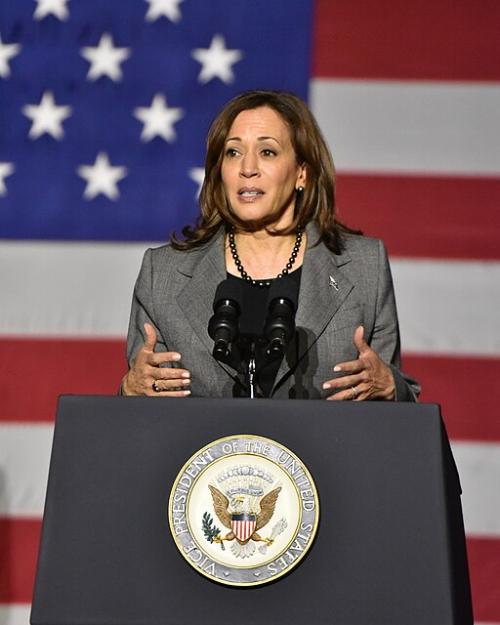As Vice President Kamala Harris garners crucial support for her presidential campaign, Cornell University experts discuss the potential implications and challenges she might face. Their insights range from political strategy to social dynamics, offering a comprehensive analysis of Harris’ candidacy.
Doug Kriner, a professor of government and policy and author of "The Myth of the Imperial Presidency: How Public Opinion Checks the Unilateral Executive," says a Harris candidacy may revitalize the Democratic base, but that it’s far from certain if she’ll appeal to necessary swing voters.
“Today’s headlines announce that Kamala Harris has secured support from enough delegates to win the Democratic nomination on the first ballot," says Kriner. "Since President Biden’s withdrawal from the race, his delegates are free to back any candidate they choose – and they can still change their minds up until their votes are cast. But with leading potential rivals from Gretchen Whitmer to J.B. Pritzker to Gavin Newsome having already endorsed Harris, the vice president is clearly now the presumptive nominee.
“Should Democrats have closed ranks so fast? Is a coronation devoid of any input from the rank and file a good look for a party campaigning on ‘defending democracy?’ Democrats are in a real Catch-22 – and they would have been in much the same boat even if President Biden had stepped aside weeks ago. On the one hand, Harris is the sitting vice president. She is the logical choice. Alternatives including some form of quasi mini-primary or an open convention would be inherently messy and uncertain. And not nominating Harris could alienate key constituencies. However, as vice president, Harris is inextricably tied to an unpopular administration and will be on defense on key issues like inflation and immigration. And in most of the polling data we’ve seen such far, Harris does not significantly outperform Biden. A Harris candidacy may re-energize the base – but it is far from certain that she will show greater appeal to swing voters," Kriner says.
Kate Manne, a professor of philosophy, researches feminist and social philosophy and is the author of "Down Girl: The Logic of Misogyny." She says the fate of the country relies on constituents to oppose the misogynoir Harris is about to face as a presidential candidate.
“There is no question that Harris’s candidacy will open up a torrent of misogynoir, a term coined by Moya Bailey and Trudy for the intersection of misogyny and racism (particularly anti-Black racism, although Harris is also of course South Asian)," says Manne. "It’s our job to fight it in our circles and even ourselves. Opposing the misogynoir Harris is about to face loudly and vocally is the only way forward. The fate of our country hangs precariously in the balance.”
Samantha Sheppard is an associate professor of cinema and media studies and author of "Sporting Blackness: Race, Embodiment, and Critical Muscle Memory on Screen." She says Black women celebrity activism could be critical in the next few months of this election cycle.
“In the last few days, we've witnessed the power and purchase of Black voters, particularly Black women," says Sheppard. "Before President Biden stepped down, it was clear that Black voters would stand by him as he faced re-election. Now that Biden has stepped aside, we are witnessing the deep and vested interest of Black voters and women in supporting the presumed Democrat nominee Vice President Kamala Harris.
“We are witnessing the unique role that Black women celebrities, who have been marginalized in their own industries, as they take center stage in the effort to support Vice President Harris. Last night's class #WinWithBlackWomen Zoom event included 40,000 Black women who discussed how they would support Harris, raising $1 million in four hours. Many Black women celebrities were on that call.
“I think we're going to see and hear a groundswell of Black women celebrity activism. It has already begun. Kerry Washington, Viola Davis, Jennifer Lewis and others have pledged their support. These Black women celebrities are going to be the difference maker in pushing non-Black celebrities to be vocal and supportive of Harris. This is key. This has been a tough year for Black women in leadership (e.g., Claudine Gay). It's critical for Black women with platforms to work together to rise above the misogynoir that Harris will face," Sheppard says.
Riché Richardson is a professor of African American literature and an expert in black feminism and gender studies. She comments on Harris' legacy.
"The prospect of Vice President Kamala Harris receiving the Democratic Party's nomination to run for president and also be elected as the first woman in this nation’s history to serve in that capacity is exciting, just as the momentum that she has generated in just the first week of campaigning is historic," says Richardson.
"As I have mentioned in my research, she is part of a long history and legacy of Black women emerging as national icons spanning back to the antebellum era, a pattern in the political arena that I trace from the post-Emancipation era that is the obverse of stereotypes recurrently linked to Black womanhood in areas such as advertising," Richardson says.
For interviews contact Damien Sharp, 540-222-8208, drs395@cornell.edu.




